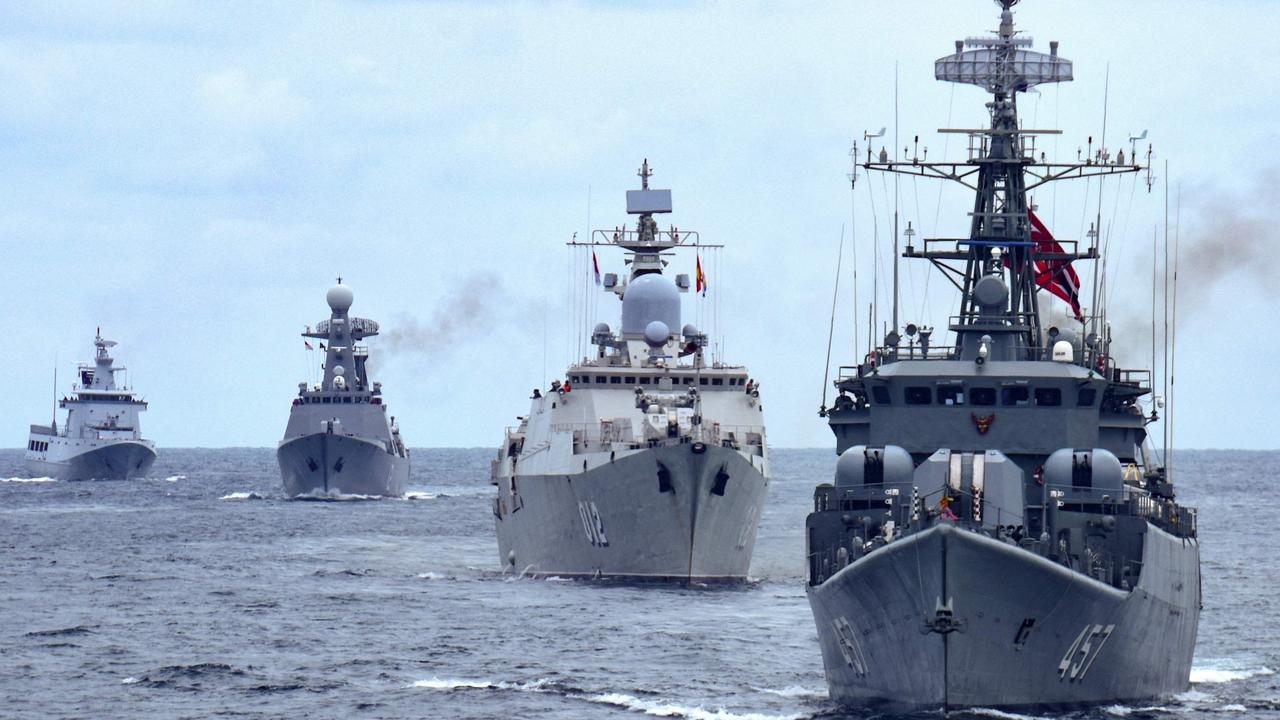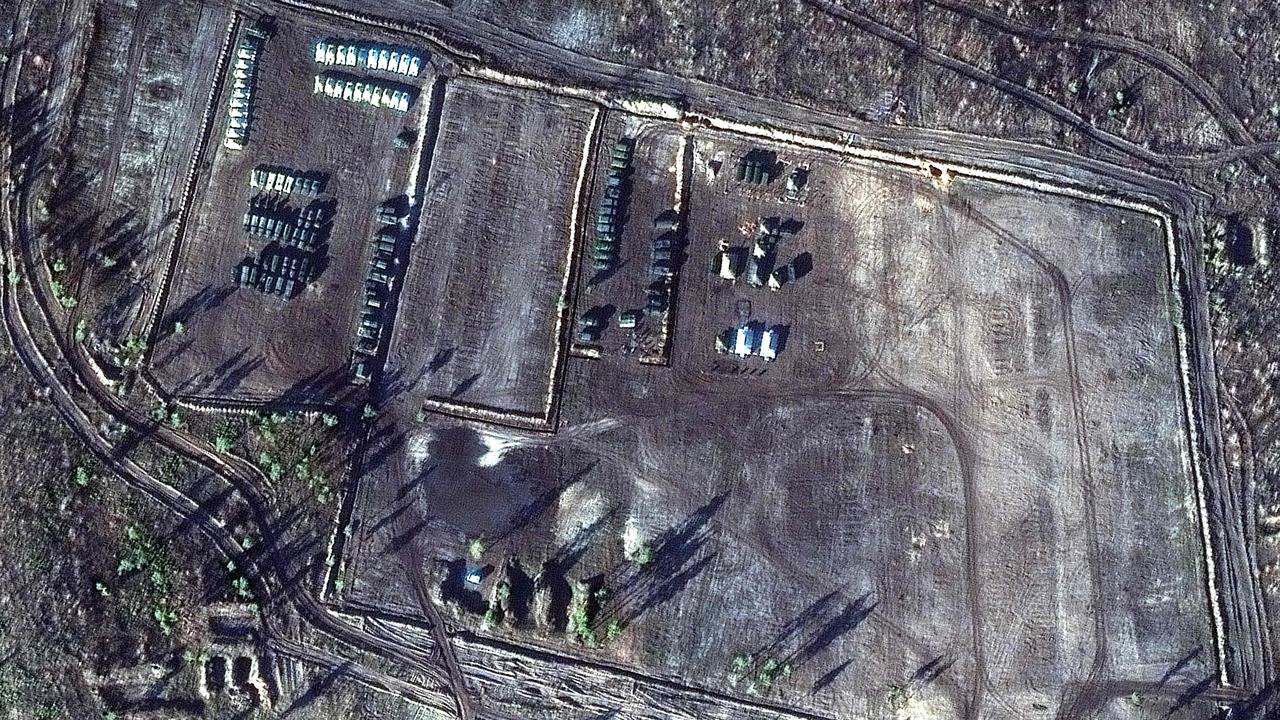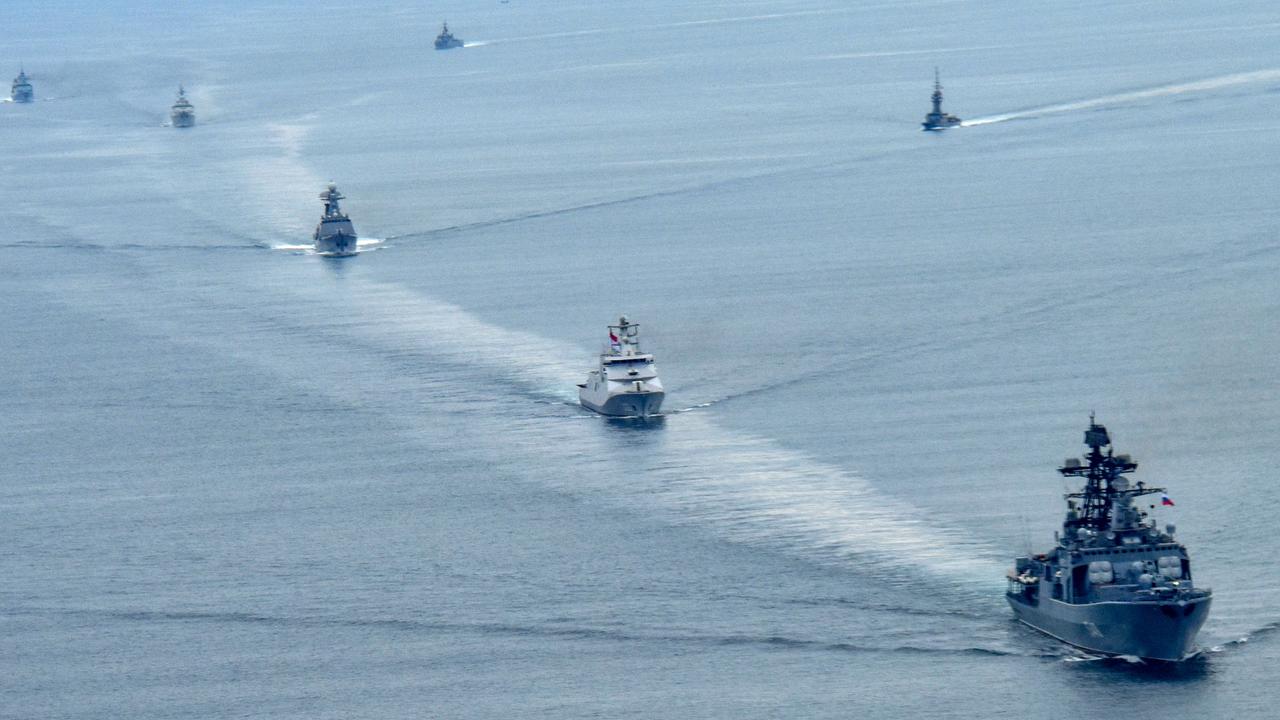China and Russia uniting against what they call ‘violation’ and ‘interference’ from the West
The relationship between these two superpowers has been flourishing and now they’re strengthening their pushback against the West.

Chairman Xi Jinping and President Vladimir Putin met virtually this week. The resulting message was clear: “The West should not underestimate China and Russia’s ability to protect each other’s core security concerns.”
And it’s already much more than a post-summit press release.
There is as yet no formal alliance between the two bastions of autocracy. But, according to Chairman Xi, that’s a good thing. He reportedly said that the relationship between Moscow and Beijing “in its closeness and effectiveness … even exceeds an alliance”.
President Putin was equally effusive.
“A new model of co-operation has been formed between our countries — one based on foundations like noninterference in each other’s internal affairs and respect for each others’ interests,” he told state-controlled media immediately after the summit.
Chinese President Xi Jinping and Russian President Vladimir Putin pledged joint action to thwart any attempts to interfere in the domestic affairs and legitimate interests of both nations and to uphold international justice and fairness. #XiJinpinghttps://t.co/T9cIcBpVxYpic.twitter.com/zetx3P5y9T
— China Daily (@ChinaDaily) December 16, 2021
The expanded commitment to co-operation comes after a year of high-profile joint operations.
Joint military exercises between the Central Asia neighbours are nothing new. But the scale of such operations has been rising. And their joint strategic bomber and warship patrols have been reaching further into the Indo Pacific.
In October, Moscow and Beijing sent task groups into the Sea of Japan for a large scale naval exercise. The combined fleet then pointedly sailed the narrow gap between Japan’s two home islands – Honshu and Hokkaido – before circling back to the contested East China Sea.
Tokyo issued no protests.
“No violation of territorial waters has taken place, and no international rule has been ignored,” Japan’s Ministry of Defence stated.
But the existence of such rules is at the core of Xi and Putin’s complaints.
“China and Russia need to launch more joint actions to uphold the security interests of the two sides more effectively,” a Beijing-controlled CGTN summary of the summit states. “Efforts must be made to firmly reject hegemonic acts and the Cold War mentality under the disguise of ‘multilateralism’ and ‘rules,’” Xi said”.
Birds of a feather …
Xi praised China-Russia relations for “emerging from all kinds of tests to demonstrate new vitality”.
But the pair were meeting to find ways to support each other in significant tests looming for 2022.
Putin faces an international backlash as he amasses troops, tanks and aircraft on the borders of Ukraine.
Beijing, for its part, has been unable to reign in mounting criticism of its treatment of the Uighur and Tibetan ethnic minorities, and its crackdown on Hong Kong. Taiwan is also winning international sympathy over China’s combative rhetoric.

At the core of this week’s discussions was Russia’s vulnerability to international sanctions. Its economy, key corporations and politicians have been subject to targeted bans following the seizure of Georgian territory in 2008, and again after the 2014 invasion of eastern Ukraine and Crimea.
Xi and Putin reportedly agreed on creating an “independent financial infrastructure”. This would reduce their vulnerability to Western banks and international financial and trade bodies.
Security was at the top of the authoritarians’ minds.
Xi said they agreed the two nations should “more effectively safeguard the security interests of both parties”.
“We firmly support each other on issues concerning each other’s core interests and safeguarding the dignity of each country,” he said.
Brothers in arms
Early this year, the Chinese and Russian foreign ministers met and issued a joint statement saying the international order “does not represent the will of the international community”.
Days later, Moscow began massing troops on its border with Ukraine. Beijing launched a high-profile simulated beach assault and upped the tempo of its combat aircraft flights close to Taiwan.
Such hostile acts may not be carefully co-ordinated. But they are certainly complementary.
And military co-operation between Beijing and Moscow is set to rise.
“Certain international forces under the guise of ‘democracy’ and ‘human rights’ are interfering in the internal affairs of China and Russia and grossly trampling on international law and universally recognised norms governing international relations,” Xi reportedly said.
Putin’s push in Ukraine was the subject of particular attention.
“On Russia’s part, NATO’s likelihood of expanding eastward, coupled with the spectre of weaponising Russia’s periphery, demands credible negotiation with the US on what Russia has rightly communicated as its sovereign redlines,” stated Xi.
Putin accuses NATO of threatening Russia’s borders. He asserts that its military support of Ukraine’s independence is proof of this.
“(This) focus follows a streak of hollow threats from select Western powers about unilateral sanctions against Russia, fueled by imaginations of so-called Russian aggression and provocation,” the CGTN editorial states.
“It is here that Xi’s support for Putin’s demands for written security guarantees is a welcome reinforcement of shared security concerns, underpinned by a clear-cut message: that select Western powers should not underestimate China and Russia’s ability to protect each other’s core security determinants in the neighbourhood.”
Pacific partnership
Co-operation between the militaries of Beijing and Moscow is at an all-time high. Their warships co-operate on large-scale operations in the Indian and Pacific Oceans. Their strategic bombers also conduct joint patrols through contested airspace.
Amid it all, Russia has been busily restoring its Cold War-era presence in the Indo-Pacific.
In October, Moscow and the Association of Southeast Asian Nations (ASEAN) issued a joint communique promising joint efforts towards “maritime security and safety, freedom of navigation and overflight and unimpeded commerce”.
On December 1, this was put into effect for the first time.
Russia’s Pacific Fleet sent ships to join Indonesia, Malaysia, Myanmar, Singapore, Thailand and Vietnam in a joint ASEAN exercise. The purpose was to practice joint operations involving search-and-rescue and anti-piracy actions.
ASEAN is pointedly trying to remain aloof from the crisis unfolding on its doorstep, the South China Sea. It also this year held similar naval exercises with Australia, Britain, the United States and China.

Meanwhile, Moscow’s been digging in.
Early this month, the state-run RIA Novosti news agency (RT) announced Moscow had sent a mobile missile unit to the remote Kuril Islands. The Bastion missiles it deployed are believed to have a range of about 400km and can travel at two-and-a-half times the speed of sound.
Soviet troops seized the southern Kuril Islands in the closing days of World War II. Tokyo insists they still form part of its Northern Territories.
Whoever owns these islands controls the narrow channels between the North Pacific and the Sea of Okhotsk. And Russia’s particularly sensitive about these waters, no matter what the United Nations Convention on the Law of the Sea has to say about them.
Moscow is not a signatory to UNCLOS. Nor is Washington. But Beijing is.
Russian and US forces regularly face-off in the Sea of Okhotsk, the Bering Strait and the Sea of Japan. Each accuses the other of being provocative and of “unsafe” conduct.
“We are not preparing to repel a hypothetical Chinese invasion across the Amur River,” Professor Artyom Lukin of Russia’s Far Eastern Federal University said earlier this year. “Instead, the emphasis in military planning in the Far East is aimed at containing the US-Japanese threat.”
Jamie Seidel is a freelance writer | @JamieSeidel






